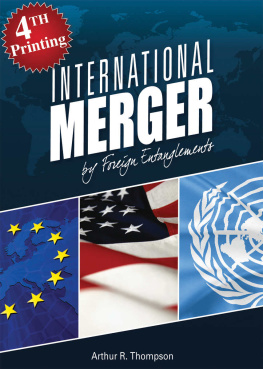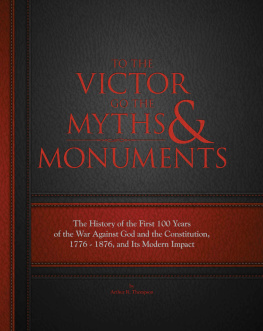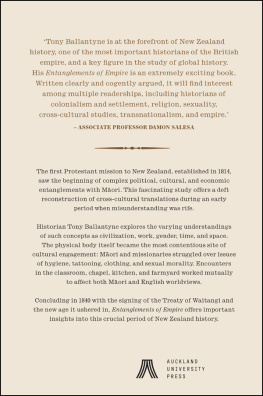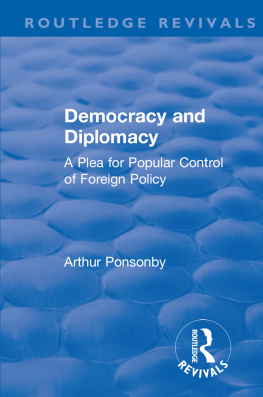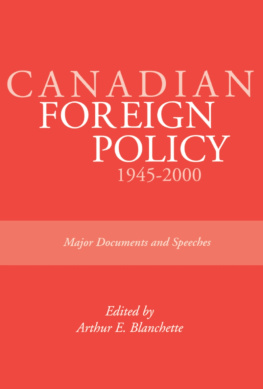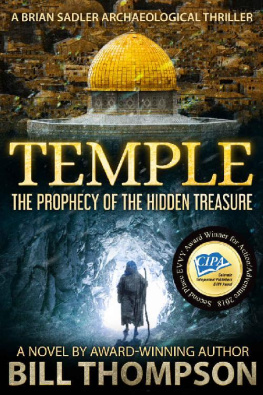Arthur R. Thompson - International Merger by Foreign Entanglements
Here you can read online Arthur R. Thompson - International Merger by Foreign Entanglements full text of the book (entire story) in english for free. Download pdf and epub, get meaning, cover and reviews about this ebook. year: 2014, publisher: The John Birch Society, genre: Science / Politics. Description of the work, (preface) as well as reviews are available. Best literature library LitArk.com created for fans of good reading and offers a wide selection of genres:
Romance novel
Science fiction
Adventure
Detective
Science
History
Home and family
Prose
Art
Politics
Computer
Non-fiction
Religion
Business
Children
Humor
Choose a favorite category and find really read worthwhile books. Enjoy immersion in the world of imagination, feel the emotions of the characters or learn something new for yourself, make an fascinating discovery.
- Book:International Merger by Foreign Entanglements
- Author:
- Publisher:The John Birch Society
- Genre:
- Year:2014
- Rating:3 / 5
- Favourites:Add to favourites
- Your mark:
- 60
- 1
- 2
- 3
- 4
- 5
International Merger by Foreign Entanglements: summary, description and annotation
We offer to read an annotation, description, summary or preface (depends on what the author of the book "International Merger by Foreign Entanglements" wrote himself). If you haven't found the necessary information about the book — write in the comments, we will try to find it.
International Merger by Foreign Entanglements — read online for free the complete book (whole text) full work
Below is the text of the book, divided by pages. System saving the place of the last page read, allows you to conveniently read the book "International Merger by Foreign Entanglements" online for free, without having to search again every time where you left off. Put a bookmark, and you can go to the page where you finished reading at any time.
Font size:
Interval:
Bookmark:

e-Publication Copyright 2017 The John Birch Society
All rights reserved.
Published by The John Birch Society
Appleton, WI 54914
Please rate and review International Merger by Foreign Entanglements at Amazon.com
Cover designed by Katie Bradley
First Printing, January, 2014
Second Printing, June, 2014
Third Printing with Addendum, September, 2015
Fourth Printing, Expanded edition, October 2017
Copyright 2017 by The John Birch Society
Published by
The John Birch Society
770 N. Westhill Boulevard, Appleton, Wisconsin 54914
www.jbs.org
LC Control Number 2013957836
Printed in the United States of America
ISBN: 1-881919-12-9
The great rule of conduct for us in regard to foreign nations is in extending our commercial relations, to have with them as little political connection as possible.... It is our true policy to steer clear of permanent alliances with any portion of the foreign world.
George Washington,
Farewell Address, 1796
Contents
Introduction
T he people of the United States are being fed a constant diet of treaties, agreements, pacts, and partnerships, and most of them are sold under the banner of free trade. Never in our nations 230-year history has our country negotiated and entered into as many as we have seen over the past couple of decades. Its time to take a closer look at what is involved in these agreements, regardless of their stated purpose, to see if there is a recurring pattern.
When dealing with the issue of foreign policy where treaties and trade agreements are created, two principles must be kept in mind, and they both have to do with the freedom and independence of the American people.
First, is the oft-repeated adage coined by the English nobleman known as Lord Acton:
Power tends to corrupt, and absolute power corrupts absolutely.
Since the power he referred to resides in government, an added rule is that the larger the government and the more power it has, having taken it away from the people, the more corrupt that government is likely to be.
Second, other warnings given by the men who founded our great American experiment in liberty had some very sage advice for us concerning foreign policy:
It is our true policy to steer clear of permanent alliances with any portion of the foreign world.
George, 1796
Commerce with all nations, alliance with none, should be our motto.
Thomas Jefferson, 1799
I deem [one of] the essential principles of our government [to be] peace, commerce, and honest friendship with all nations, entangling alliances with none.
Thomas Jefferson, 1801
Here we have two lessons that have a direct bearing on the modern pacts, such as the free trade agreements that our government is negotiating and signing with countries around the globe. There always is a desire for commerce, but there is great danger in forming alliances that really have very little to do with trade and have a lot to do with the accumulation of power, particularly international power through regional institutions, such as the European Union, and worldwide institutions, such as the United Nations.
The titles given these various treaties and agreements may suggest benefits for the participants and their peoples, but their texts contain precisely what Lord Acton and Americas founders warned about.
Let us quote one more American, Mark Twain:
The only difference between reality and fiction is that fiction needs to be credible.
What we will be discussing will at times seem to be incredible because it is real, a reality rarely discussed when discussing U.S. foreign policy. However, it is a reality that anyone can verify online if there is a desire to do so. We will supply references from time to time so that this valuable tool can be put to use.
Under the Banner of Commerce, Our Nation Is Forming Permanent Alliances
I n various pacts the U. S. government has entered into since the end of World War II, we have been witnessing entanglements that deliver power to international organizations through regional institutions, such as NAFTA (the North American Free Trade Agreement), and worldwide institutions, such as the United Nations. This is the consistent pattern that runs throughout all of our foreign dealings.
The titles on these pacts promote an idea that is very different from the actual contents of the packages, although there are hints of their contents from time to time even within the titles. And, all too often, negotiations are kept secret not only from the American people but from Congress as well. Repeatedly, elected officials see the agreements only a short time before they are asked to vote on them. Sometimes, they never see the documents. Rarely do they have enough time to thoroughly read and understand them.
Lack of Transparency
Over the last two or three decades, increasing reliance on secrecy has come to dominate the federal administration and the congressional leadership . This can be readily seen in proposed groundbreaking laws and treaties. Once enacted, secrecy remains a presence in the implementation of the various pacts.
In addition to secrecy, there exists a tactic that has been used on occasion to gain approval of controversial treaties. It involves moves by the Senate leadership, based on the ratification provision of Article II, Section 2 provided two thirds of the Senators present concur (emphasis added), that the majority of the Senate would reject. We will give an example in Chapter Nine.
Let us state up front that we believe that a large majority of Americans would support genuine free trade between the businessmen of one country and those of another. But, the results of trade pacts are something far different from the promises given to the American people and Congress as reasons to support the agreements.
If trade between countries were truly free, there would be no need for hundreds or thousands of pages to spell out what it shall or shall not entail.
Ask yourself if the following is the kind of agreement you could support: A single piece of paper signed by leaders of two or more countries stating that there will be no interference by the respective governments with the transactions between their businessmen. Except for cases where fraud or national security considerations exist, the government will have nothing to offer. Its all very simple.
Some individuals will claim that the trade issue is so complex and so important that there is a need to spell out every minute detail. This is a smokescreen designed to discourage anyone from questioning what the mountains of paper say and mean. The agreement should not be complex and neither should the powers of a properly created government.
Keep in mind that our nations Constitution as the supreme law of the land governs the entire complex United States by spelling out what the federal government may do. And it was originally written on four sheets of paper!
Why then do negotiations for free trade agreements take years to complete? Studies made about these negotiations even take a great deal of time and money. And finally, why are the finalized agreements as thick as municipal telephone books?
Ask yourself some further questions: Have trade agreements negotiated in the past few decades actually added to Americas economic vitality? How many jobs and factories moved out of our country as a result of these pacts? Have any of these agreements benefited small and medium-sized businesses, the heart of the American economy? Or, have they mainly helped the multinational corporations whose leaders boast of their international loyalties and their lack of concern about the value of our nations independence?
Next pageFont size:
Interval:
Bookmark:
Similar books «International Merger by Foreign Entanglements»
Look at similar books to International Merger by Foreign Entanglements. We have selected literature similar in name and meaning in the hope of providing readers with more options to find new, interesting, not yet read works.
Discussion, reviews of the book International Merger by Foreign Entanglements and just readers' own opinions. Leave your comments, write what you think about the work, its meaning or the main characters. Specify what exactly you liked and what you didn't like, and why you think so.

